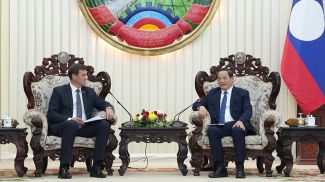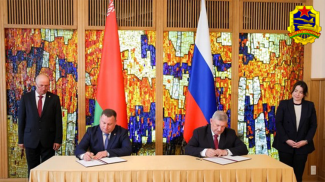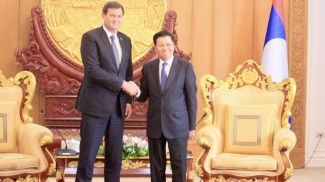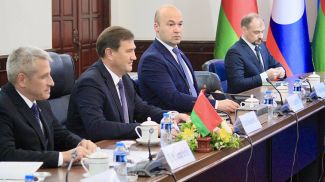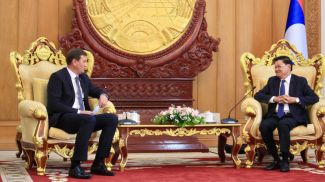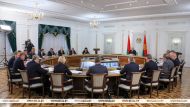In his speech during a patriotic forum held in honor of People's Unity Day in September Belarus President Aleksandr Lukashenko stated that since the end of the Cold War it was the first time the mankind had been on the brink of a nuclear conflict. Is the situation really that dangerous? What consequences can a nuclear war cause? The archive documents and recollections we have studied represent another confirmation that using nuclear weapons is the worst way to wage a war. What do people experience when a nuclear bomb goes off? What is the difference between strategic and tactical nuclear missiles? What is behind the concept of limited nuclear war? Why does Lukashenko call nuclear weapons "weapons of madmen"? The project After the Fact: Decisions of the First One on BelTA's YouTube channel answers these questions.
How were nuclear weapons removed from Belarus?
In 1993 Belarus voluntarily relinquished nuclear weapons. Everything the country had kept after the collapse of the USSR was moved to Russia. The last freight cars left Belarusian territory to the sound of a military march while being closely watched by foreign diplomats. Igor Baranov, a soloist with the orchestra of the guard of honor company of the Minsk Commandant's Office, took part in a nuclear weapon removal ceremony in Lida in 1996.
He recalled: “They said that we were going to Lida. We waited all day and were allowed to go home. As we were packing up the instruments, a soldier came running: ‘Departure at 6:00 tomorrow morning.' Here we go again. We loaded up and went to Lida. And it was certainly interesting there. The entire diplomatic corps, almost the entire planet, and Russian Defense Minister Grachev. We approached the last freight car, the tail of a Topol missile was loaded. The lid was closed, sealed, and the freight car was attached to the train. The train started moving and we saw it off while the song Farewell of Slavianka was playing. Where else could I see a nuclear missile up close and personal? It was a spectacle not for the faint of heart, of course, when these missiles are rolled up onto MAZ trucks, when these Topols are transported."
Welcoming this step of the Belarusian side, the UK, Russia, and the USA provided security guarantees to the country. They were stipulated by the Budapest Memorandum on 5 December 1994. As they say, thank you doesn't pay the bills, but, on the other hand, Belarus was promised that weapons would never be used against its territorial integrity and political independence. World leaders assured Belarus' leadership that they would refrain from economic coercion aimed at subordinating Belarus to their own interests.
The memorandum was signed by the UK prime minister, the presidents of the United States, Russia, and Belarus. Today, 20 years later, we already see that loud promises and statements turned out to be nothing but words. Let's be honest though. It became clear in the first few years after the memorandum was signed.
Why did Belarus agree to relinquish nuclear weapons?
According to some reports, Belarus' nuclear stockpiles were estimated at $5 billion. Russia wrote off a billion as the cost of some intrastate procedures. Like, cleansing the air and territory from nuclear waste. Promises and assurances cost another 4 billion.
Aleksandr Lukashenko told reporters in 2003: “If we wanted to sell these weapons, to put it bluntly, we had $5 billion worth of them in our territory. The warheads alone could have fetched $5 billion and the figure exists. A nuclear power plant unit could have worked for ten years and the nuclear power plant could have generated 1,000MW. Instead we gifted it to Russia, we simply gave it away to Russia and got nothing in exchange. Due to Western pressure. Americans were moving all of it to Russia. We gave away nuclear weapons. We lost a huge amount of money. Let alone political costs.”
One starts wondering. Why did Aleksandr Lukashenko agree to these arrangements back then? Everything is simple. They were made even before his presidency, so there was no longer any subject for negotiations. "We trusted the promises wrapped in a beautiful candy wrapper of the West," Belarusian Minister of Foreign Affairs Vladimir Makei said to explain those decisions. But the head of state was still able to convert his signature into a financial benefit for Belarus: Russia agreed to write off Belarus' $500 million debt for natural gas. Russia had issued invoices to all CIS countries after the USSR collapse.
But Belarus blames mostly Western partners. At a recent summit of the Conference on Interaction and Confidence-Building Measures in Asia in Astana Aleksandr Lukashenko stated: “Belarus was one of the post-Soviet countries which voluntarily relinquished nuclear weapons. What did we get in return? Assurances instead of genuine international legal guarantees, empty and unsupported declarations like the Budapest memorandum, endless attempts to destabilize the situation in calm and hardworking Belarus. Foreign curators almost openly controlled the mutiny in the country in 2020.”
Why would Belarus need nuclear missiles?
Back in 2003 Aleksandr Lukashenko described nuclear weapons as a weapon of madmen. Why? According to the president, no one in their right mind would press the red button: “Show me the person, who will give an order to push the nuclear button. As the president I want you to show me such a madman. There are none. Because he will be cursed, he will be torn apart sooner or later even if he survives this fire, god forbid. It is impossible to use nuclear weapons from the human, psychological point of view and on the whole.”
“I totally don't condone it and hate it,” the head of state has not changed his rhetoric even 20 years later.
But the situation around Belarus has changed dramatically. Like it or not, the Belarusian president has to think about how to restrain those who go crazy.
“Putin and I once said in St Petersburg that we will refit Belarusian Sukhoi aircraft among other things so that they could carry nuclear weapons. Do you think we talk nonsense? Everything is ready! If they start making problems or even worse than that for Belarus, the answer will be instantaneous,” the head of state warned them.
What does the limited nuclear war concept mean?
Back in the middle of the 20th century the United States came up with the concept of a limited nuclear war. It implies targeted nuclear strikes against, as they like to say these days, energy infrastructure installations, communication centers, and military headquarters.
But, if you think that atomic bombings will primarily target the enemy army, just remember the history. In 1945 Americans dropped an atomic bomb on Hiroshima. They did not purposefully seek military targets. Firstly, the chances of hitting an urban area are much higher than the chances of hitting an infrastructure facility or a military headquarters. Secondly, they wanted to achieve a powerful psychological effect. Has anything changed today? As we can see, it is possible to use conventional weapons to destroy an ammunition depot or disable infrastructure. The use of nuclear bombs is just manipulation. A cruel and cynical one.
What nuclear weapons exist?
Dmitry Matusevich, a professor with the Engineering Support, NBC Protection, and Ecology Chair of the Military Academy, explained: “Nuclear weapons can be extremely large and extremely small. The yield of extremely small ones is under 1 kilotonne of the TNT equivalent. The yield of extremely large ones is over 1 megatonne. The warhead yield of strategic and tactical nuclear weapons is different. The warhead yield of tactical weapons is under 2 kilotonnes, as a rule. The warhead yield of strategic nuclear weapons is much larger than that, naturally.”
The expert believes that a nuclear war cannot be limited. The use of nuclear bombs will cause a chain reaction. “It will be a chain reaction. Someone throws a stick at another person, that person throws one back,” the professor explained it figuratively. “Then another person and yet another one get involved. Essentially, we can destroy ourselves.”
What are the consequences of nuclear strikes?
An atomic bomb was dropped on Hiroshima in the morning on 6 August. The fuse of the 4-tonne bomb went off 600 meters from a hospital where seriously ill children were being treated. 90% of the people within up to 800 meters from the epicenter died within minutes after the explosion. Their bodies turned to charcoal. Birds, which were flying by, were burned in the air. Paper ignited at a distance of up to 2km. Light radiation burned the dark pattern of people's clothes into their skin and left silhouettes of human bodies on the walls. The death toll from the direct impact of the explosion was estimated at 70-80 thousand people. By the end of 1945 the total death toll had climbed to 90,000 and 166,000 people due to radioactive contamination and other delayed effects of the explosion.
It was the Little Boy bomb. Its yield was equivalent to 13-18 kilotonnes of TNT. Today typical American warheads aimed at Russia have the yield of 475 kilotonnes of TNT. An atomic bombing will set off a chain reaction regardless of who starts it. It is unlikely that anyone will leave such actions unanswered. No, countries will not grind each other to dust. Nuclear winter will not come. Most of the people will survive in bomb shelters and cellars. But does it calm you down?
Maria Germenchuk, Deputy Director of the International Sakharov Environmental Institute of the Belarusian State University, explained that the explosion of a nuclear bomb is accompanied by extremely powerful burst of light, a very strong electromagnetic pulse, and a heat wave in excess of anything else. “It is so powerful that the radioactive contamination that comes later is just a consequence, which is overlooked in the short term in comparison to the first massive explosion,” she said. “Radioactive contamination will not matter for those in the epicenter of the explosion and even up to 10km from it. They will go blind. They may be incinerated due to the extremely powerful heat effect.”
Will Russia use nuclear weapons?
Let's think logically. If Belarus has to use aircraft carrying nuclear weapons, it will not be the first atomic bombing in the region. And most likely not even the second or third. It will be just part of a chain reaction, which means the consequences will be catastrophic. Aleksandr Lukashenko says that Vladimir Putin does not intend to use nuclear weapons. And we want to believe it. The Belarus president tirelessly urges everyone to calm down and start negotiations.
The use of nuclear weapons, according to Aleksandr Lukashenko, means only one thing - the beginning of World War Three. "Who wants to die today?" the president wonders without too much pathos.
Today's world is not what it was 70-80 years ago. The “Nuclear Club” includes a dozen countries. Their weapons are deployed in other countries, too. Therefore, one should not hope that nuclear weapons will be used only as part of a local conflict.
“It is necessary to anticipate everything and fear everything. Who can say today that World War 3 won't happen? We have never been so close to it. But I don't believe that there will be World War 3. I don't believe because World War 3 may result in the destruction of everyone and everything. Who would want to die today?” the president stressed as he visited a military training area in Brest Oblast.

What do you do after a nuclear explosion?
“If something happens, you have to follow official messages from the Emergencies Ministry, municipal administration bodies. They are supposed to say what measures should be taken. People may be advised to take iodine as a preventive measure or stop consuming local foods, stop consuming drinking water, or limit their outdoor presence. So the system is in place. You just have to pay close attention to what the official bodies responsible for radiation safety are going to say,” Maria Germenchuk warned just in case.
The ecologist believes that consequences of the Chernobyl nuclear power plant accident could have been less devastating for the people if iodine-based prevention measures had been implemented in Belarus on time. This is why taking Iodomarin is quite a sensible decision, Maria Germenchuk believes. “Without overdoing it. Don't consume too much Iodomarin and don't drink alcohol-based iodine solutions,” the expert advised.
Those, who seriously fear a nuclear war, should have a supply of drinking water at home and a battery-powered radio. “If the power grid goes down, you will be able to listen to recommendations of the Emergencies Ministry and the Healthcare Ministry,” she noted.
What financial damage does radiation cause?
No matter how much we get told about nuclear weapons, we may never realize the gravity and horror of the consequences of their use. Hiroshima bombing happened far away. By our standards, the Chernobyl catastrophe happened a long time ago. And look around: Japan is thriving, Belarus continues to develop steadily. In other words, you can survive everything and cope with everything, right? It seems you can. But imagine even on the scale of Belarus: if the Chernobyl accident had not happened, how many people would live happily today, how much additional funds could be directed to various areas? Experts estimate the damage of the Chernobyl catastrophe in Belarus at $235 billion and the country's spending on overcoming consequences of the catastrophe in 1986-2015 at $192 billion.
But when everyone keeps talking about the prospects of a nuclear war, how can one look into the future with confidence and calmly enjoy the present? Perhaps the Belarusian president is worth listening to: “People have already sensed that something is not okay, that there are some tensions, and so on. They wonder what should be done and how. I repeat once again that everyone should continue doing their job.”
***The project has been created using the target levy for the production of national content.




